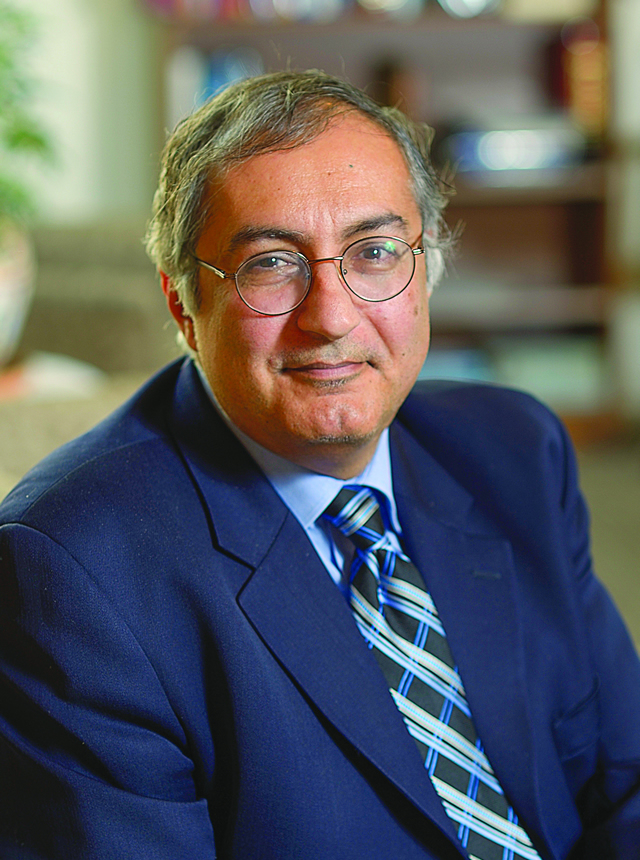Weather Alert: Following the winter storm, all Temple Health hospitals, campuses and clinical locations remain open. Patients will be contacted directly if their visit is affected. Please check TempleHealth.org or FoxChase.org for updates and monitor myTempleHealth for changes to scheduled appointments.
Breadcrumb
- Home
- Fox Chase Cancer Center News
- Understanding How an Anticancer Drug Works Can Pave the Way for Personalized Therapy
Understanding How an Anticancer Drug Works Can Pave the Way for Personalized Therapy
PHILADELPHIA (February 16, 2016) – Fox Chase Cancer Center – Temple Health researchers have identified a way forward for personalized cancer treatments for a wide range of cancers by understanding how to stimulate the activity of a potent anticancer protein called TRAIL.
Their findings, published Feb. 16 in Science Signaling, provide new insight into the mechanisms of a small molecule and investigational new drug for cancer called ONC201. The drug not only stimulates TRAIL, but also the death receptor for TRAIL (also known as DR5) on tumor cells. This allows TRAIL to specifically kill tumor cells.

“We have revealed in unprecedented detail exactly how ONC201 works across a broad range of tumor types, and this has important clinical implications,” said senior study author Wafik El-Deiry, MD, PhD, FACP, a medical oncologist and Deputy Director for Translational Research at Fox Chase Cancer Center.
“For example, our findings suggest that patients with various solid tumors, as well as multiple myeloma may be particularly sensitive to the effects of ONC201. We have identified a potential biomarker that could be used to select which patients are most likely to benefit therapeutically from this drug,” said El-Deiry, who is also an American Cancer Society Research Professor, co-leader of the Molecular Therapeutics Program, and the William Wikoff Smith Endowed Chair in Cancer Research at Fox Chase.
TRAIL is a promising anticancer protein because it induces cell death in a wide range of cancers while sparing normal cells, but its therapeutic benefit is limited because of undesirable drug properties, such as a short half-life, difficult and expensive production, the need to give as intravenous infusion and poor penetration into certain tissues like the brain, El-Deiry said.
“This prompted us to look for better options for therapeutics that can kill tumor cells,” he said.
In the new study, El-Deiry and his team analyzed gene activity and protein levels in nine tumor types treated with ONC201, a drug given as a pill now being tested in clinical trials. The details of how ONC201 works have been under intense study. El-Deiry’s group discovered that ONC201 triggers an increase not only in TRAIL, but also TRAIL receptor abundance leading to tumor cell death through the integrated stress response that tumor cells normally use to survive. But when over-activated by a drug like ONC201, the tumor cells are blocked from growing and/or are killed.
The new insight is that ONC201 pushes the integrated stress response too far, causing tumor cells to stop dividing and/or die. One protein in particular called ATF4 is stimulated and plays a critical role in ONC201’s anticancer activity. In essence, ONC201 delivers a double whammy to tumor cells, which may explain why it has such broad-spectrum anticancer activity, El-Deiry said.
Moving forward, the study has several clinical implications. For one, solid tumors or myeloma cells that normally create large amounts of protein during growth are predicted to be particularly sensitive to ONC201. The integrated stress response is often activated in these cells, and ONC201 may push them over the edge.
“Knowing how ONC201 works helps us look for its effects in patient’s tumor cells that have been treated,” El-Deiry said. “Looking in a tumor or liquid biopsy before and after treatment may help predict who is most likely to benefit.”
El-Deiry said, “We are optimistic that through basic and clinical research with ONC201, our findings will lead to improved TRAIL-based therapies for individual cancer patients in the future.”
“ONC201 kills solid tumor cells by triggering an integrated stress response dependent on ATF4 activation by specific eIF2α kinases,” Authors: C. Leah B. Kline, A. Pieter J. Van den Heuvel, Joshua E. Allen, Varun V. Prabhu, David T. Dicker, Wafik S. El-Deiry, Science Signaling.
Financial Disclosures: Dr. El-Deiry’s laboratory research on ONC201 at Fox Chase Cancer Center is supported by grants from the National Institutes of Health and the American Cancer Society. As a founding partner, Dr. El-Deiry has a financial stake in Oncoceutics and ONC201; however, Fox Chase Cancer Center has no financial ties to the company.Fox Chase Cancer Center (Fox Chase), which includes the Institute for Cancer Research and the American Oncologic Hospital and is a part of Temple Health, is one of the leading comprehensive cancer centers in the United States. Founded in 1904 in Philadelphia as one of the nation’s first cancer hospitals, Fox Chase was also among the first institutions to be designated a National Cancer Institute Comprehensive Cancer Center in 1974. Fox Chase is also one of just 10 members of the Alliance of Dedicated Cancer Centers. Fox Chase researchers have won the highest awards in their fields, including two Nobel Prizes. Fox Chase physicians are also routinely recognized in national rankings, and the Center’s nursing program has received the Magnet recognition for excellence six consecutive times. Today, Fox Chase conducts a broad array of nationally competitive basic, translational, and clinical research, with special programs in cancer prevention, detection, survivorship, and community outreach. It is the policy of Fox Chase Cancer Center that there shall be no exclusion from, or participation in, and no one denied the benefits of, the delivery of quality medical care on the basis of race, ethnicity, religion, sexual orientation, gender, gender identity/expression, disability, age, ancestry, color, national origin, physical ability, level of education, or source of payment.
For more information, call 888-369-2427